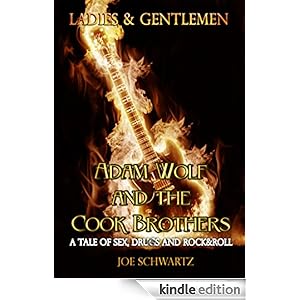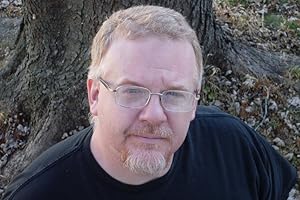You don’t need to be a rock history buff to know that it started as a
rebellion against the mainstream. Many legendary rockers had a rocky (pun
intended) start in life, coming from financial and moral deprivation, ended up
attaining fame and fortune only to end up not far from where they started. That
seems to be a logical life cycle of a rocker. I’ve often wondered: is it
mandatory to come from disadvantage, abuse and oppression to understand Rock
& Roll? At what point does the music of rebels become vanilla mainstream?
Joe Schwartz opens up about the inspiration behind his edgy, raw and heartfelt
novel Ladies and Gentlemen: Adam Wolf and the Cook Brothers: A Tale of Sex,Drugs and Rock&Roll.
MJN: The tag line is very tongue in cheek
"sex, drugs and rock&roll". It's going to solicit a certain
reaction from the prospective readers. Sex, drugs and rock&roll make
a sort of trinity. Can you have without the other two? Or if you embrace
that lifestyle, does it have to be the whole package?
JS: Sex, drugs, and rock&roll is a cliche because it’s
true. The trappings of success one might say. In the beginning, music is
everything, but after the show, when all that adrenaline has nowhere to go,
using drugs or alcohol to excess and having casual sex with anonymous bodies is
merely a way to come down, back to reality if that is possible. It's all fun
and games until a friend dies from an OD or somebody gets pregnant. To be in a
band and be popular is akin to winning the lottery, nothing can prepare you for
it and almost everyone f**ks it up.
MJN: The cover features a guitar on fire. This is very ... Meal Loaf.
MJN: The cover features a guitar on fire. This is very ... Meal Loaf.
JS: My publisher and I discussed what the cover might look
like. I personally was all in favor of buxom rock babes in bikinis washing a
4x4. Fortunately, she is much wiser than that. The Meatloaf comparison is
reasonable as in the end she was inspired to make the book cover more like an
album cover and I personally couldn't be happier.
MJN: Tell us about some of the idols who shaped your musical tastes.
MJN: Tell us about some of the idols who shaped your musical tastes.
JS: I'm from St. Louis and here we have great radio. I was
listening to Blue Oyster Cult and Deep Purple before I'd learned to write
cursive. I've always loved the deep sensitivity of Folk and the passion of
Metal. Peter, Paul and Mary are as important to me as Hendrix and The Beatles
mashed with a disproportionate amount of Metallica, Red Hot Chili Peppers, Led
Zeppelin, Robin Trower, and many, many others.
MJN: "Middle-class assholes". This is an expression from your novel. The core mission of rock&roll was to defy the philistine bourgeois values. And yet, many rockers dream of private jets and five-star hotel rooms, attributes one normally associates with that loathsome capitalist minority. Can you talk about the balance of exclusive prestige and power-to-the-people democracy in the world of rock?
MJN: "Middle-class assholes". This is an expression from your novel. The core mission of rock&roll was to defy the philistine bourgeois values. And yet, many rockers dream of private jets and five-star hotel rooms, attributes one normally associates with that loathsome capitalist minority. Can you talk about the balance of exclusive prestige and power-to-the-people democracy in the world of rock?
JS: Everyone sells out. It’s called pop music because it is
popular. I think of four guys in a rock band no differently than a team of kids
playing ball dreaming of the big leagues. When you are poor, you naturally
dream of being rich. In the meantime, you hate that which you do not have.
Besides, dreaming of fame and fortune never live up to what it’s like when or
if you finally get them. Everyone is a hypocrite when it comes down to it. I
think it’s a matter of knowing who you really are before the journey ever
begins and not lying to yourself about it. If want to change the world, you
can't bitch about barely making it and if you want to be filthy rich, you have
no right to complain that people don't take your work seriously. If you rather
not compromise your integrity, choose a line of work that doesn't involve
applause.
MJN: I have to commend you on the psychological authenticity of your novel. I've read works written by sheltered, "square" individuals who use exaggeratedly cocky slacker diction in their writing to give themselves "street creds", even though it's easy to tell that this sort of diction doesn't come to them naturally, and it's not used in their environment. It's a real treat to read something authentic. Do you express yourself like that in real life?
JS: I write like I talk, mostly, and my characters are
speaking with their real voices, the sounds of my impoverished, indigent
childhood filled with violence, dissidence, and abuse. 'Write what you know' is
the mantra but few are faithful to the truth worried about offending somebody.
When a writer, or musician for that matter, is willing to cross that line and
ignore the status quo, they may not be very popular but they'll certainly be
unique, an individual among clones. Turns out the only gimmick that has ever
really worked, and gotten anyone any respect in the process of doing it, is
being themselves when it would be far easier not to be.


No comments:
Post a Comment